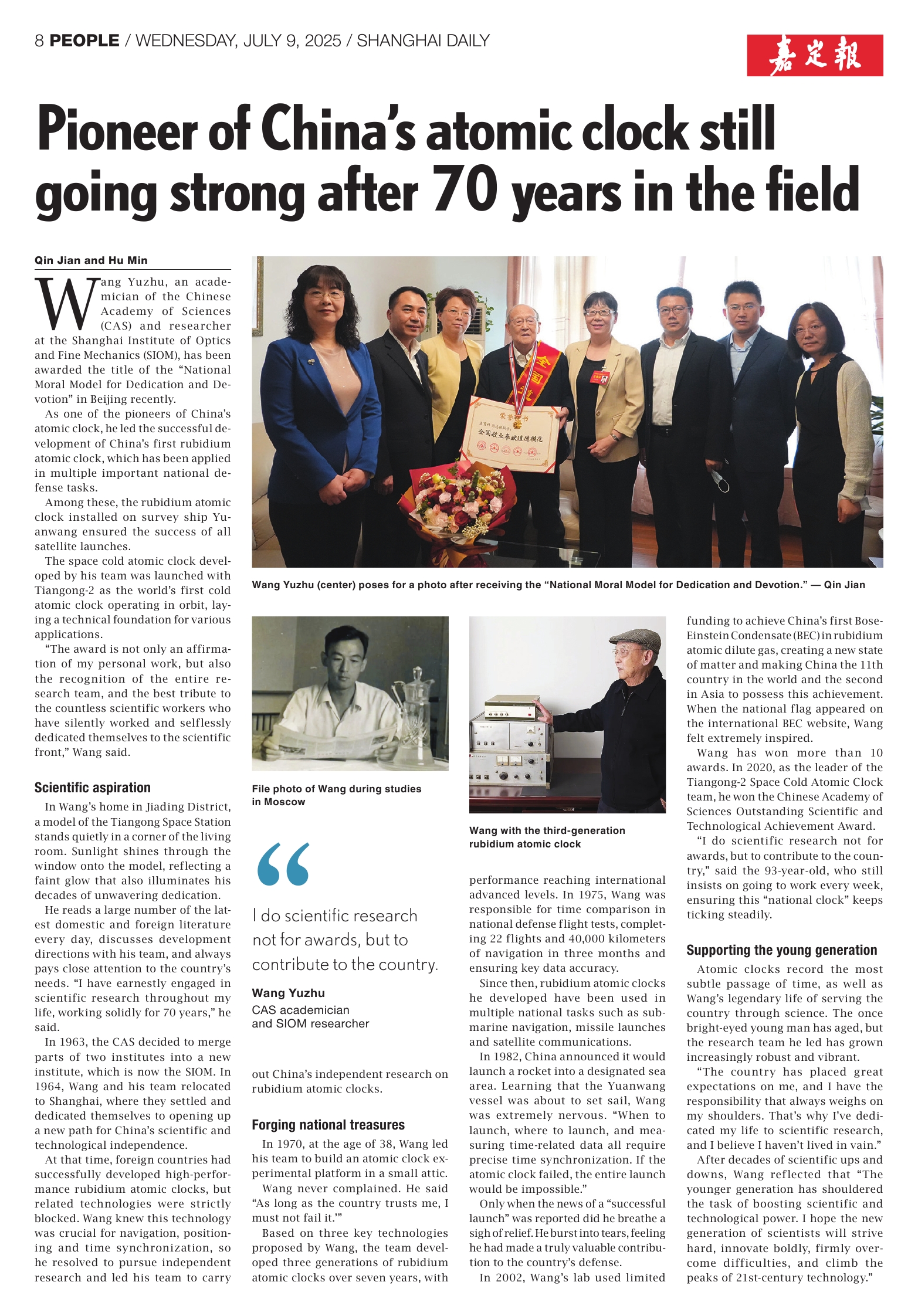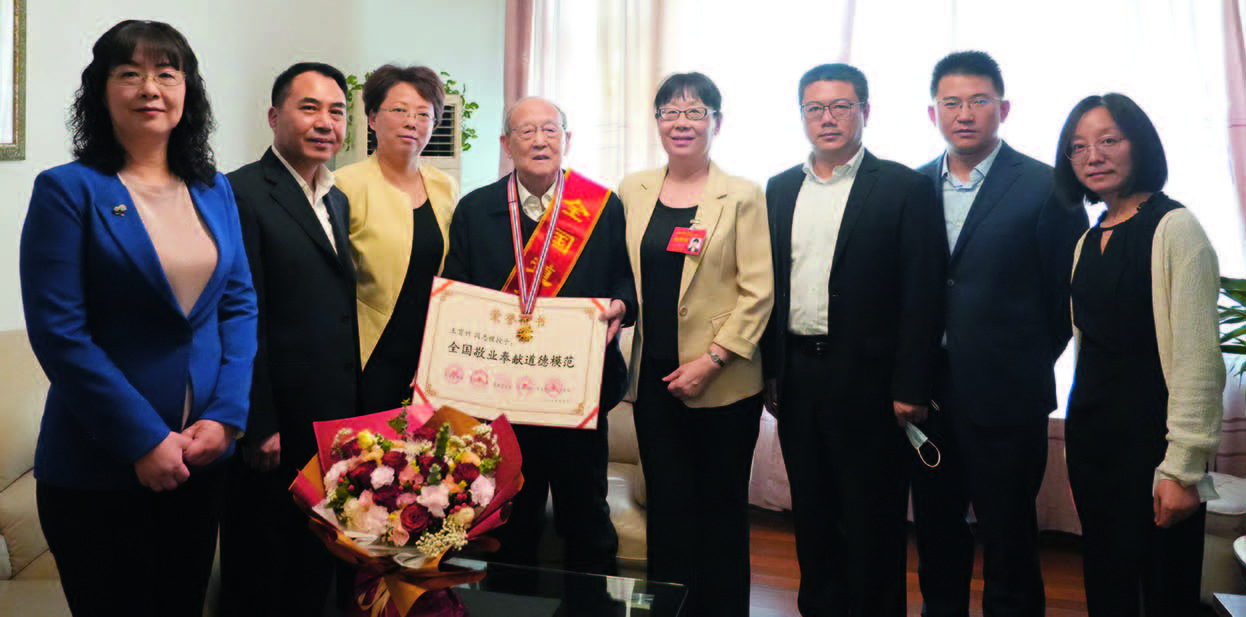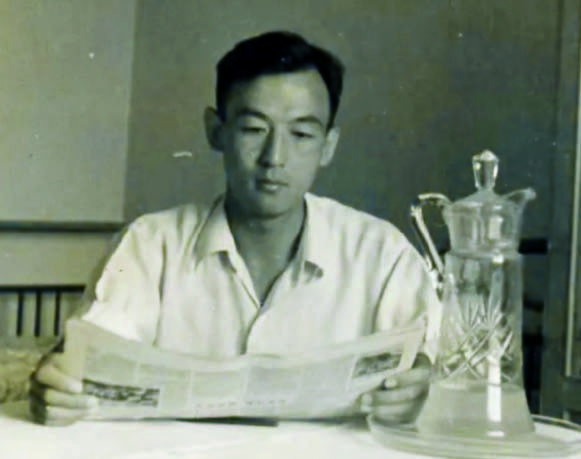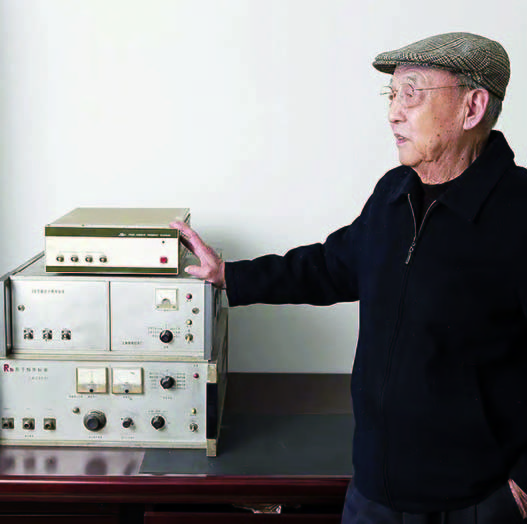

Pioneer of China’s atomic clock still going strong after 70 years in the field

Wang Yuzhu (center) poses for a photo after receiving the “National Moral Model for Dedication and Devotion.” — Qin Jian

File photo of Wang during studies in Moscow

Wang with the third-generation rubidium atomic clock
I do scientific research not for awards, but to contribute to the country.
Wang Yuzhu
CAS academician and SIOM researcher
Qin Jian and Hu Min
wang Yuzhu, an acade-mician of the Chinese Academy of Sciences (CAS) and researcher at the Shanghai Institute of Optics and Fine Mechanics (SIOM), has been awarded the title of the “National Moral Model for Dedication and De-votion” in Beijing recently.
As one of the pioneers of China’s atomic clock, he led the successful de-velopment of China’s first rubidium atomic clock, which has been applied in multiple important national de-fense tasks.
Among these, the rubidium atomic clock installed on survey ship Yu-anwang ensured the success of all satellite launches.
The space cold atomic clock devel-oped by his team was launched with Tiangong-2 as the world’s first cold atomic clock operating in orbit, lay-ing a technical foundation for various applications.
“The award is not only an affirma-tion of my personal work, but also the recognition of the entire re-search team, and the best tribute to the countless scientific workers who have silently worked and selflessly dedicated themselves to the scientific front,” Wang said.
Scientific aspiration
In Wang’s home in Jiading District, a model of the Tiangong Space Station stands quietly in a corner of the living room. Sunlight shines through the window onto the model, reflecting a faint glow that also illuminates his decades of unwavering dedication.
He reads a large number of the lat-est domestic and foreign literature every day, discusses development directions with his team, and always pays close attention to the country’s needs. “I have earnestly engaged in scientific research throughout my life, working solidly for 70 years,” he said.
In 1963, the CAS decided to merge parts of two institutes into a new institute, which is now the SIOM. In 1964, Wang and his team relocated to Shanghai, where they settled and dedicated themselves to opening up a new path for China’s scientific and technological independence.
At that time, foreign countries had successfully developed high-perfor-mance rubidium atomic clocks, but related technologies were strictly blocked. Wang knew this technology was crucial for navigation, position-ing and time synchronization, so he resolved to pursue independent research and led his team to carry out China’s independent research on rubidium atomic clocks.
Forging national treasures
In 1970, at the age of 38, Wang led his team to build an atomic clock ex-perimental platform in a small attic.
Wang never complained. He said “As long as the country trusts me, I must not fail it.’”
Based on three key technologies proposed by Wang, the team devel-oped three generations of rubidium atomic clocks over seven years, with performance reaching international advanced levels. In 1975, Wang was responsible for time comparison in national defense flight tests, complet-ing 22 flights and 40,000 kilometers of navigation in three months and ensuring key data accuracy.
Since then, rubidium atomic clocks he developed have been used in multiple national tasks such as sub-marine navigation, missile launches and satellite communications.
In 1982, China announced it would launch a rocket into a designated sea area. Learning that the Yuanwang vessel was about to set sail, Wang was extremely nervous. “When to launch, where to launch, and mea-suring time-related data all require precise time synchronization. If the atomic clock failed, the entire launch would be impossible.”
Only when the news of a “successful launch” was reported did he breathe a sigh of relief. He burst into tears, feeling he had made a truly valuable contribu-tion to the country’s defense.
In 2002, Wang’s lab used limited funding to achieve China’s first Bose-Einstein Condensate (BEC) in rubidium atomic dilute gas, creating a new state of matter and making China the 11th country in the world and the second in Asia to possess this achievement. When the national flag appeared on the international BEC website, Wang felt extremely inspired.
Wang has won more than 10 awards. In 2020, as the leader of the Tiangong-2 Space Cold Atomic Clock team, he won the Chinese Academy of Sciences Outstanding Scientific and Technological Achievement Award.
“I do scientific research not for awards, but to contribute to the coun-try,” said the 93-year-old, who still insists on going to work every week, ensuring this “national clock” keeps ticking steadily.
Supporting the young generation
Atomic clocks record the most subtle passage of time, as well as Wang’s legendary life of serving the country through science. The once bright-eyed young man has aged, but the research team he led has grown increasingly robust and vibrant.
“The country has placed great expectations on me, and I have the responsibility that always weighs on my shoulders. That’s why I’ve dedi-cated my life to scientific research, and I believe I haven’t lived in vain.”
After decades of scientific ups and downs, Wang reflected that “The younger generation has shouldered the task of boosting scientific and technological power. I hope the new generation of scientists will strive hard, innovate boldly, firmly over-come difficulties, and climb the peaks of 21st-century technology.”
江苏路特数字科技有限公司 仅提供技术服务支持, 文字、图片、视频版权归属发布媒体


